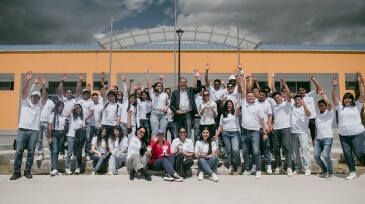engineering education
-
Petroleum engineering education is at a crossroads, with university enrollments shrinking and a talent gap looming. Take a look at what the data really show about degree trends, why Gen Z is turning away from engineering, and how SPE—from K–12 outreach to lifelong upskilling—is uniquely positioned to impact the industry’s future workforce.
-
Major increases in hydrocarbon production require both incremental and revolutionary technologies, industry leaders said during the SPE Hydraulic Fracturing Technology Conference.
-
For more than a century, LSU has shaped petroleum engineering education, but few assets showcase its impact like the PERTT Lab. With six deep test wells and rare reservoir-depth gas-injection capabilities, the facility is helping drive breakthroughs in well control, carbon-dioxide injection, and next-generation energy technologies.
-
SponsoredAdvance your career with the new Pipeline Engineering Program at the Technical University of Leoben, a 5-month course combining on-campus and online learning, integrating industry expertise, engineering practice, and future-ready skills for professionals in oil, gas, and emerging energy systems.
-
The 1-day seminar, presented by SPE Western Australia and Australian Energy Producers, featured Dr. Peter Moore’s flagship “Introduction to Oil & Gas” seminar for more than 400 students and guests.
-
The visit included hosting an inaugural Energy4me session, joining ANP’s 17th anniversary party, and visiting the historic village of Balibo on the Indonesian border with SPE’s Timor-Leste student chapter officers.
-
The SPE Ecuador Section brought the excitement of robotics and energy education to life through an intensive 1-day Energy4me training, reaching 1,324 children from rural Quito.
-
The university's 142-ft multiphase flow loop tower is a 10-story engineering marvel pushing the boundaries of petroleum research in production operations, flow assurance, and safe offshore drilling.
-
SPE Western Australia held an inaugural career fair in Dili with more than 200 students in attendance.
-
The SPE Timor-Leste Section officially launched on 7 November with a celebration of 200 guests and an array of dignitaries across a range of industries.
Page 1 of 6










